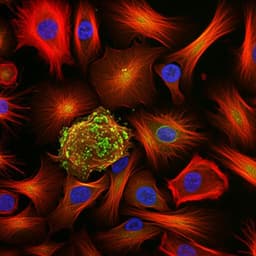
Medicine and Health
Single-cell transcriptomics reveals aberrant skin-resident cell populations and identifies fibroblasts as a determinant in rosacea
M. Chen, L. Yang, et al.
This groundbreaking study explores the unique cellular landscape of rosacea in female patients, revealing a distinct keratinocyte subpopulation linked to barrier damage. The research, conducted by Mengting Chen and colleagues, identifies fibroblasts as key contributors to inflammation and vasodilation, offering new insights into potential treatments. Discover how blocking certain signaling pathways could transform therapeutic strategies for rosacea.
Related Publications
Explore these studies to deepen your understanding of the subject.







